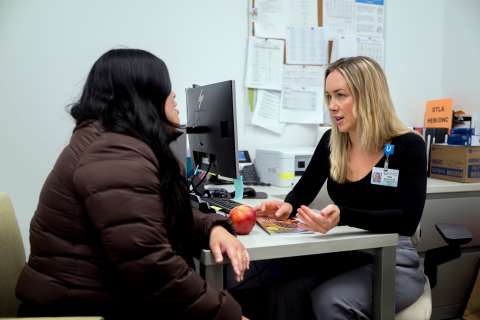People with cancer are at risk of developing orthorexia: an unhealthy obsession with healthy eating.
While not an official medical diagnosis, orthorexia is a form of disordered eating that is common among people undergoing cancer treatment or in survivorship, says Eve Lahijani, RDN, a registered dietitian nutritionist with the Simms/Mann UCLA Center for Integrative Oncology.
A 2022 study of young women with cancer found that more than half of respondents reported symptoms of orthorexia. It also found the condition was more common among women with cancer than those without the disease.
It’s not unusual for people who receive a frightening medical diagnosis to question their own habits as a potential cause, Lahijani says.
“It’s normal for a person who receives such a shocking diagnosis to retrace their steps and ask themselves, ‘How did I get cancer?’ And, very understandably, they want to fix that,” she says. “They want to be absolved of this health issue, so they think about the parts of their lives over which they have the most control, so they may reason, ‘How can I fix what I’m eating so I can fix what is happening to me?’”
However, this desire to support good health by eating well can sometimes turn into an obsession that may include cutting out certain foods or entire food groups; extreme meticulousness in checking ingredient lists and nutrition labels; and restricting a diet to foods deemed “healthy” or “pure,” according to the National Eating Disorders Association.
In people with cancer, orthorexia isn’t usually about losing weight, Lahijani says, but about a “fixation on eating in a way they believe is perfectly healthy” – such as avoiding seed oils, gluten, dairy, sugar and any other ingredient they feel isn’t “perfect,” she says.
The condition can be hard to spot, she says, since friends, family members and society often cheer efforts to eat better.
“Restricting foods can often be reinforced by well-meaning people around them,’” Lahijani says. “Oftentimes the patient doesn’t realize it’s a problem. They feel righteous in what they’re doing.”
This is why working with a registered dietitian nutritionist can be helpful. These experts in food and eating behaviors can guide individuals back to balance, particularly during cancer treatment, which can often cause nausea, diarrhea and constipation that make eating more challenging.
Undoing orthorexia
Often the first step to helping patients find a more relaxed approach to food is reassuring them that their eating habits aren’t responsible for their disease, Lahijani says.
“It’s letting them know that they didn’t cause their cancer. It’s not their fault,” she says. “I can’t tell you how many times I’ve had patients in tears saying, ‘Thank you for saying that.’”
Food education is part of her approach. She explains the basic science of proteins, carbohydrates and fats and how protein needs increase during chemotherapy and other cancer treatments. She shows people how to meet their nutritional needs with regular meals throughout the day, by discussing what a healthy plate might look like tailored to their needs and preferences.
For patients with specific fears around certain foods, Lahijani even does a kind of “food exposure therapy,” she says – a gradual reintroduction of foods they may have eliminated in their quest for “perfect” eating. This might include eating a sandwich with a piece of bread, she says, or ordering a latte in a coffee shop.
Lahijani says she generally doesn’t encourage patients to measure their foods or track macronutrients, as is popular among fitness influencers on social media.
“The way I talk about nutrition is not numbers – we don’t eat numbers, we eat food,” she says. “So let’s put food on a plate and talk about what I want your plate to look like, because food doesn’t have to be so precise and exact.”
Lahijani appreciates that the Simms-Mann Center makes registered dietitians available at no cost to people undergoing cancer treatment at UCLA Health, since good nutrition can play a critical role in supporting recovery. Conditions such as orthorexia, however, can hinder well-being even as patients strive to be as healthy as possible.
“Part of healthy eating,” Lahijani says, “is a healthy relationship with food.”




